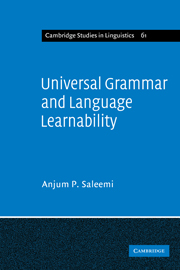
-
Select format
-
- Publisher:
- Cambridge University Press
- Publication date:
- 04 August 2010
- 26 March 1992
- ISBN:
- 9780511753237
- 9780521109178
- Dimensions:
- Weight & Pages:
- Dimensions:
- (229 x 152 mm)
- Weight & Pages:
- 0.27kg, 180 Pages
You may already have access via personal or institutional login
Book description
Anjum P. Saleemi argues that the acquisition of language as a cognitive system can properly be understood by pairing the formal approach to learning, often known as learnability theory, with Chomsky's theory of Universal Grammar and its claim that human language is innately constrained, with some predefined space for variation. Focusing on specific areas of syntax, such as binding theory and the null subject parameter, Dr Saleemi unites learnability theory's methodology with Chomsky's principles-and-parameters model, and construes acquisition as a function of linguistic principles with largely domain-specific learning procedures, mediated by environmental input. The aim of this study is to show that a self-contained linguistic theory cannot by itself be psychologically plausible, but depends on a compatible theory of learning which embraces developmental as well as formal issues.
Contents
Metrics
Full text views
Full text views help Loading metrics...
Loading metrics...
* Views captured on Cambridge Core between #date#. This data will be updated every 24 hours.
Usage data cannot currently be displayed.
Accessibility standard: Unknown
Why this information is here
This section outlines the accessibility features of this content - including support for screen readers, full keyboard navigation and high-contrast display options. This may not be relevant for you.
Accessibility Information
Accessibility compliance for the HTML of this book is currently unknown and may be updated in the future.


